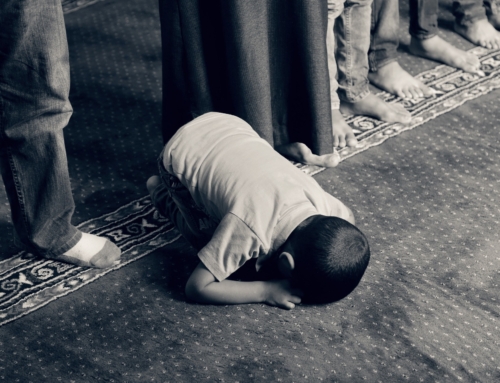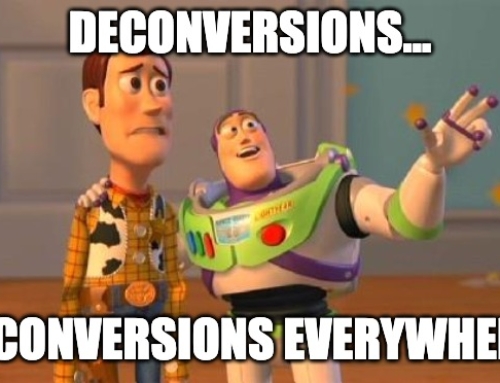In a few short weeks, I graduate from seminary with a Master’s degree.
I’m relieved; it’s the end of a significant stage of my life, where significant parts of work or school involve Christian ministry. I’m excited for the breather, but proud of myself for sticking with it, though admittedly, courses were often so interesting that sticking with it was easy.
But I’m perhaps even more proud of a strange thing: I’m proud for choosing to take a break from Christian ministry despite graduation.
While I never began the degree for the purpose of using it as a pastor or Christian worker exclusively, I still struggle at times with whether or not the time was “wasted.”
I’ve decided it wasn’t: any degree is, potentially, time well spent, both because you’ve learned things (about the subjects and about life) and because you’ve performed admirably in obtaining something that was challenging, hopefully with some valuable friends and experiences made along the way.
Here are some of those religiously neutral “life” things I’ve learned during my time at seminary.
(PS – if you want me to post some of my more interesting papers on subjects like abortion, slavery, baptism… let me know! Enjoy.)
The more you learn, the more uncertain you may become (at first).
This is the sign of a great education: when you have learned enough to know how little you know.
It’s not that I know less. Rather, I passed that point in the Dunning-Kruger effect where you know enough such that you feel like you know it all. I got to that point where you start to think: “Uh-oh. Now I feel like I know nothing.”
Contrary to how you feel at this point in an intellectual process, it’s actually a good thing. All it shows is that you’re still growing and learning.
That said, it’s incredibly humbling. I think many Christians, especially passionate young Christian guys, start to leave the faith at this point when they realize things weren’t as simple as they thought, or perhaps that they aren’t as amazing in terms of their theological knowledge or “spiritualness.”
Humble pie tastes poopy; some people give up at this point. I’m choosing not to. Instead, I’ll embrace the uncertainty that inevitably comes.
Action Point: Try arguing the Devil’s Advocate position on something you think you’re certain about. See if you can’t make a good case, or even give it the benefit of the doubt. Alternatively, intake content by people you disagree with.
Faith and reason are friends, even if they fight sometimes.
I knew this one already, but a refresher never hurts. It was more confirmed from a historical perspective.
You might wonder if this is religiously neutral or not: it is, because I’m not arguing for or against any particular religious views here. I’m merely stating what many of you know to be fact: there are brilliant minds that, in brilliant ways, hold to various religious ideas and values. Furthermore, everyone has faith, broadly speaking at least, since we all have underlying assumptions about the world.
Some think that there are simple-minded, religious folks (Muslim, Christian, whatever) and then there are the rest of us. While there are plenty of simple folks who don’t tend to think of much outside their small world, there are plenty of religious folks who think, think and think some more, more than you ever have, about wild things that you may find hard to even comprehend. History is littered with their paper and their ink, if you bother to look.
Action Point: Read content from old dead people, especially in philosophy or theology. Focus on one or two who you find interesting.
Moral questions are much more complicated than you think.
When I entered my Moral Theology class, I kind of assumed we’d learn a surefire way to figure out any moral problem. It would go something like this:
- Someone comes to you with a moral problem.
- You figure out what the Bible says about that Moral Problem.
- Tell them. If it’s super hard, pray some more.
- Everyone goes home happy.
I exaggerate somewhat. Still, I more or less assumed the moral problems of life would go away once I had a better grip on the Bible. While the Bible helps a lot here, it simply doesn’t give us a black and white picture of our moral landscape and what to do about it. At least not when it comes to the real genuine moral dilemmas, of which there are plenty.
Don’t get me wrong; the class was an excellent Christian ethics class, and the Bible (particularly the life of Jesus) is incredibly powerful for moral wisdom. I’d still say our culture’s distancing from it has been for the worse.
But thanks to a particularly insightful and wise professor, I was able to see that life just ain’t that simple, and the Bible was never meant to be a black-and-white, binary moral dilemma solver.
It took a lot of humility to walk out of that class admitting that I was never going to have all the moral answers, no matter how well I understood the Bible.
Action Point: Go out of my way to walk with friends through difficult, morally gray decisions.
History is an excellent teacher.
To my surprise, my history courses were some of my favourites.
The past is remarkable, hilarious, inspiring, devastating and depressing, all at once. And we really need to learn from it.
That’s a life lesson: I need to learn from my own past. But man, will the results be disastrous if we don’t learn from those who came before us.
There’s a lot of bad ideas out there today, and I think many would be remedied from just a bit of history (if you still think communism is a good idea, for example).
What’s more, history is inspiring. Not the facts of history; that’s just a timeline. The people and what they did – that’s the story of humanity and how we got here. And people are, well, pretty amazing creatures. I’m humbled by all that our ancestors did to get here, and hope that I can learn from their failures as well as successes.
Action Point: Force myself to read more history, especially biographies.
Learning is best done in community.
COVID is teaching us lots. Not least among them is our need for in-person, face-to-face interaction.
The last year has been entirely online schooling for me, as it has been for most post-secondary students. Of all the things I miss, it’s learning together.
I miss the conversations over lunch reflecting on lessons or applying what we’re learning to the cultural ethos. I miss the laughter and the basketball on breaks, all of which helped the mind recharge and ready for the next class.
I even miss the sometimes annoying questions people would ask, derailing class for half an hour on some rabbit trail that I didn’t really care about.
Some of this is nostalgia, but some of it genuinely improves the learning experience. Even, apparently, the rabbit trails, which can help learning retention (a quick google search will show you how much homeschoolers love it).
COVID highlights this lesson, but it’s always been true. We are very social creatures. From a common-sense perspective, talking about the things we’re learning, bouncing ideas off of other people – all of it makes us learn better.
Other people refine our ideas and help them stick. They give us angles and insights that we never would have gotten ourselves. They make learning fun. Plus, we have the added benefit of making a deeper connection with another human being. Sure, “just getting coffee” with someone can be great. But how much better is that hang out if we had interesting, stimulating chats?
I just joined Clubhouse and am glad for the new software COVID has forced into existence (did anyone know what Zoom was 13 months ago?). Either way, I’m definitely going to make more effort to have in-person dialogue around the fun things I’m learning and thinking about.
Action Point: Host Clubhouse talks on interesting topics. After COVID, initiate in-person round-table nights with friends.
All this is just the tip of the iceberg. Any good education is going to do more than teach you what to think; it’s going to teach you how to think, and it’s going to prepare you for some real life.
How about you? Have you learned much in school that wasn’t to do with class material? I’d love to hear your lessons. Comment below or hit me up on social media. If you join Clubhouse, follow me!






